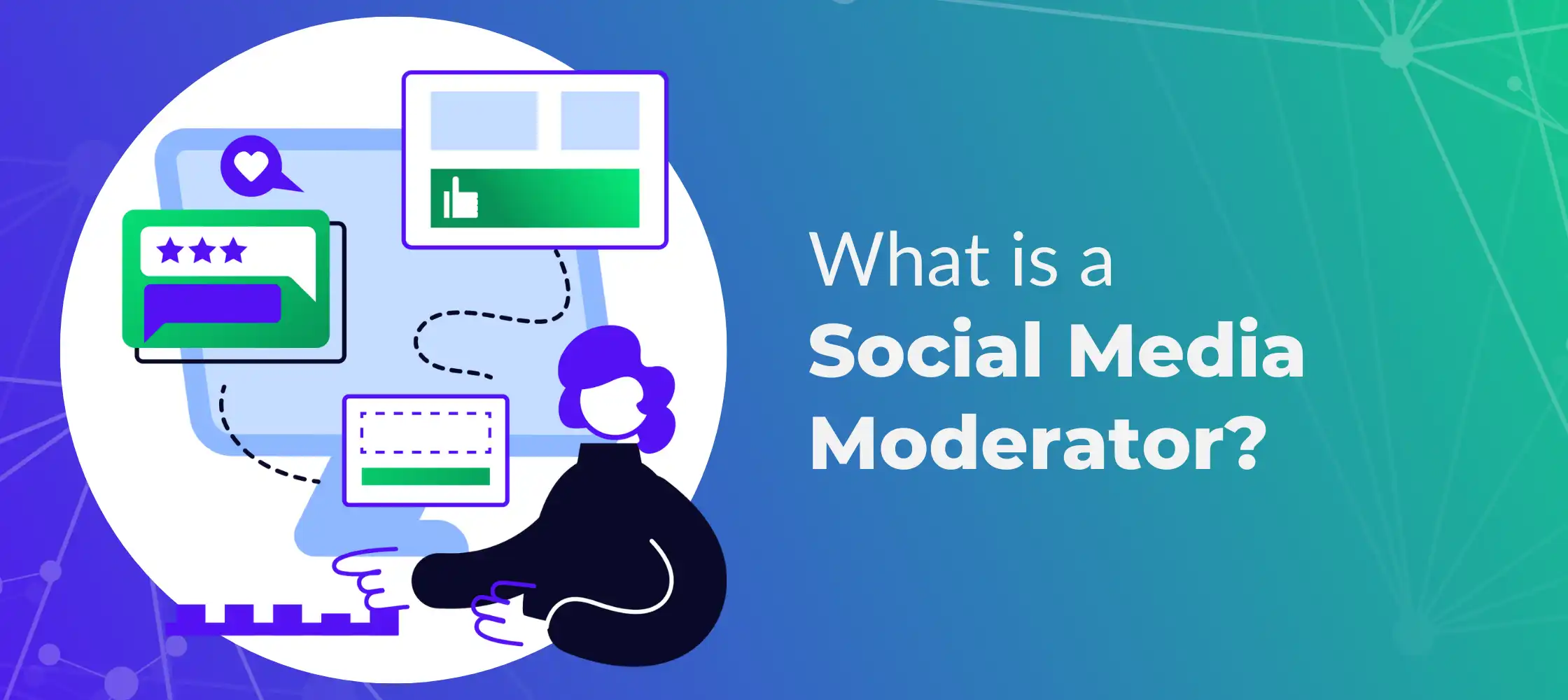A social media moderator manages the day-to-day activities on a brand’s social media platforms. Their job is to make sure a brand’s social media presence and user interaction stay within a set of limits, rules, and guidelines set by the brand, with the primary objective of user safety and enjoyment, and brand reputation security.
What Does a Social Media Moderator Do?
Social media moderators review, monitor, moderate, and respond to comments posted across social media channels (Facebook, Instagram, Twitter, etc.) on behalf of a client using their unique brand voice. Depending on their assigned projects, social media moderator tasks include:
- Sifting through different types of content (user-generated content, posts, uploads, tweets, comments, and third-party content)
- Ensuring online community safety by implementing brand guidelines and policies
- Escalating issues, observations, opportunities, and insights through relevant channels, when needed
- Crafting creative content to encourage participation and increase engagement
- Providing digital customer service by responding to queries on select channels
What Are the Responsibilities of a Social Media Moderator?
Social media moderators can be responsible for a wide range of social media tasks but are mainly focused on content and comment moderation, in order to maintain a safe online environment for a brand’s online audiences and protect a brand’s online reputation.
Content moderation
Moderators help ensure content meets brand guidelines and expectations as well as industry standards by reviewing comments, removing offensive or inappropriate content (such as harassment, bullying, or profanities), monitoring user behavior, and flagging and escalating major issues related to the brand or products.
Comment moderation
Comment moderation is the task of reviewing comments before allowing users to potentially see them. This part of moderation is useful for public conversations when there is concern over the quality and quantity of the comments appearing on a specific social media platform. It is also an important tool for assessing moderation needs and effectiveness.
Maintaining a safe, welcoming online environment
A safe and welcoming environment is key to growing a healthy online community and ensuring content doesn’t damage brand reputation. Social media moderators are responsible for preventing threats from spreading and undesirable content from being shared, as well as preventing trolling, cyberbullying, or any other content deemed harmful.
Why is it Important to Have Content Moderation on Your Social Media Platforms?
Businesses using social media platforms to promote their products and services benefit greatly from content moderation, as it helps to:
- Increase brand visibility and reputation
- Boost audience engagement
- Maintain a safe community for consumers
- Ensure your brand stays within local, national, and international laws and guidelines
- Protect users from unwanted and inappropriate content, videos, or images
- Prevent cyberbullying and trolling
- Provide a nurturing and friendly environment
- Understand customers and users
Skills and Qualities of an Effective Social Media Moderator
A good moderator possesses a set of specific skills to enhance user experience and promote a unique brand tone of voice.
Excellent communication skills
Clear and effective communication skills are essential for any social media moderator. They need to know how to express themselves with confidence and clear language in an unbiased and non-confrontational manner to best help users and brands get along in a positive, meaningful, and safe environment.
Thorough understanding of the platform’s community guidelines and policies
An effective social media moderator knows their way around popular social media platforms. A moderator must be familiar with each channel’s guidelines and policies, as their main task is to understand what type of content is allowed or needs to be hidden, removed, or reported to prevent undesirable content from being posted and uploaded.
Knowledge of social media best practices
Social media etiquette is important to master to nurture and welcome a positive environment for both users and brands. Some of these best practices include:
- Being truthful, honest, and transparent
- Never compromise on privacy and data
- Check sources to make sure no misinformation is spread
- Be inclusive in images, content, and language
Emotional intelligence
Social media moderators interact with people daily. While engaging with users, they must know how to be empathic and receptive to others’ feelings and issues. An effective moderator is able to listen to what users have to say and create a bridge between the audience and brand.
Critical thinking and judgment
The ability to make decisions swiftly and efficiently is a key skill for moderators. With the amassing content they manage daily, moderators must be able to quickly determine which content doesn’t follow established guidelines and must be escalated. An effective moderator must have the judgment to know when to ask for resources to preserve brand integrity, reputation, and audience safety before things get out of hand.
5 Tips to Moderate Social Media Platforms
There can be many hurdles or challenges to social media moderation. Here are our top 5 tips on how to tackle them.
1) Use a social media moderation service
A social media moderation service can help your business maximize its efforts to keep its community safe and happy. A team of trained expert content moderators will make sure no unwanted content gets missed, help flag any opportunities for growth, and protect brands from any potential crises.
2) Encourage staff to participate in conversations
Staff participation can improve the quality of online discussions, comments, and interactions. Brand staff are great at entertaining your brand audience, as they can set the tone of the conversation, improve interaction quality, and give users directions on the type of conversations and interactions they should have.
3) Create relationships with your members
Social media users are at the core of your brand. Content moderation will help build and nurture meaningful relationships with them. Your brand moderation strategy should prioritize your audience’s needs by taking the time to listen to what they have to say and learn from them to grow stronger together.
4) Establish clear guidelines for the community
Clear guidelines and restrictions help social media moderators during their daily tasks. Clear guidelines will also set the tone of interactions and engagement taking place on your brand’s social media channels, as well as discourage negative or harmful content to help people feel safe in your online community management.
5) Remove problematic content
Negative and problematic content can range from inappropriate to simply unacceptable or dangerous content, that may touch political or religious topics and may include profanity, spam, unsafe links, or fake news. How do you discern what is problematic versus what is simply just not ideal? Problematic content is that which falls blatantly outside of your pre-written community guidelines. As a brand moderator, it is your job to deem when content violates these community guidelines and swiftly moderate and/or remove such content.
Keep Your Community Safe with ICUC
Social media moderators monitor and manage user-generated content on social media platforms to help your brand build customer loyalty and maximize insights through human-powered solutions. Creating and growing a brand that people love and won’t stop advocating for is possible with time and the right social media moderation service.
Need help? Schedule a call with us to learn more about how your brand can harness the power of social media moderation with ICUC’s integrated, international coverage and protection services.



